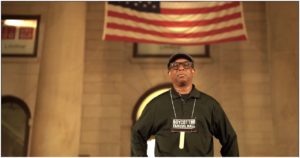Alien: Earth prepares for a killer confrontation in a suspenseful, scary, and satisfying installment where tensions reach their breaking point and a bad situation becomes worse.
“All children, except one, grow up.”
Alien: Earth is full of murderous monsters, disaffected trillionaires, and corrupt corporations, but it’s also a series that’s deeply interested in the idea of parenthood and legacy. It’s full of characters who want to live forever and ostensibly have the means to do so. Before all this, being a parent and creating life were the only ways to effectively “live forever.” Alien: Earth’s examination of parenthood has gradually morphed into a deeper deconstruction of motherhood, which has always been an important component of the franchise. The series knocks out another home run with “The Fly,” an episode that’s as tense as it is emotionally taut and thought-provoking. However, beyond the synth slaughter and bloody betrayals is a thoughtful consideration of motherhood and the matriarch’s role in a family.
Motherhood is a fascinating theme that’s coursed through the entire Alien franchise, whether it’s Ripley’s surrogate guardian relationship with Newt or even Alien: Resurrection’s contentious Newborn creation. Motherhood is endemic to this female-led sci-fi series, but it’s impressive to see how Alien: Earth has taken one of Alien: Resurrection’s most reviled ideas and turned it into a creative goldmine. It’s evidence of how changing just a few details can completely revitalize an idea and present it in a powerful new light. Motherhood is something that afflicts most of Alien: Earth’s characters in one way or another in “The Fly” and it’s interesting to see how conflicting interpretations of the theme can be played against each other.
Alien: Earth has already seeded a potential rivalry between Wendy and Nibs (Lily Newmark), but “The Fly” draws further compelling parallels between them regarding their maternal instincts and roles as guardians. Nibs becomes more convinced that she’s pregnant, while “The Fly” juxtaposes her intense feelings against Wendy’s own matriarchal experience. Wendy’s feelings are validated, reinforced, and labeled as special, whereas Nibs is placated and dismissed as being irrational. Nibs is a problem to be fixed. Wendy is a marvel to be celebrated.
Sydney Chandler has knocked it out of the park as Wendy. Some of her best work occurs in “The Fly” while she speaks to the baby Xenomorph. There’s such awe, excitement, and glee that flashes over Wendy’s face as she communicates with the creature. She’s a proud parent who can’t wait to brag about her gifted child. It’s almost like a reverse-imprinting is going on where Wendy can’t help but fall in love and connect with this creature who actually understands her. They literally speak their own language and Wendy, for once, genuinely feels seen.
This would typically be a positive experience for the world’s first hybrid, but it’s more than a tad problematic that Wendy’s bonding experience is with a perfect organism that is designed to slaughter humanity, not bow down to it. Wendy’s communication and growing relationship with the Xenomorphs continues to be Alien: Earth’s most tantalizing detail and episodes like “The Fly” intensify the terror and tension that’s baked into such an idea. There’s absolutely no way that any of this ends well. “Two is the beginning of the end,” after all, yet Wendy can’t help but believe that she can fly.
“The Fly” is fascinated by Wendy’s growing connection to the Xenomorph, but it’s equally interested in everyone’s response to this bond. Kirsh and Hermit’s debate over Wendy’s “safety” as she ingratiates herself with the infant Xenomorph is yet another fascinating distillation of Alien: Earth’s themes. It took a few episodes for Kirsh to come together as a character, but he’s reached a point now where every line that he says is practical gold that’s made infinitely more entertaining by Timothy Olyphant’s pitch-perfect performance. He’s like a wry Data with zero fucks to give. His elevator tête-à-tête with Morrow is another standout moment. Kirsh’s practical, sterile perspective on Wendy’s relationship with the Xenomorph is contrasted against Hermit’s abject fear over his sister’s well-being. It’s so heartbreaking to see his earnest desire for Wendy to have a normal life and simply live be decreed as foolishness.
To Hermit, Wendy’s role as a sister is the most important thing that she could do with her life, yet such a fate would be considered treason by Prodigy. These contrasting perspectives are in turn played against Boy Kavalier’s chaotic curiosity where he tries to turn Wendy into yet another bargaining chip that Prodigy can use against Weyland-Yutani. Alien: Earth has done such exceptional work with these diverse characters that a simple scene where technically no words — at least in English — are uttered speaks volumes for these protective figureheads in Wendy’s life who function as living versions of the Three Wise Monkeys.
Alien: Earth hasn’t hidden that it’s set in a sterile universe in which Prodigy, Weyland-Yutani, and the other mega corporations that don’t just run, but literally own the planet, view employees as products. The Xenomorph and other extraterrestrial creatures in Alien: Earth are terrifying, but so is the chilling commodification of mankind where people are reduced to grist in a mill. This nihilism has coursed through the series since its first episode, but “The Fly” extends this dilemma to husband-and-wife duo, Dame Sylvia (Essie Davis) and Arthur Sylvia (David Rysdahl), who reach an impasse over Nibs. This marital schism may not seem to be nearly as important as a wild Xenomorph. However, it’s yet another example of how this whole corporate “pursuit of greatness” pushes a pervasive apathy that erases the humanity from living, breathing people who don’t have a hard drive that can be wiped clean. Nibs is the one who gets reset in “The Fly,” but the figurative reboot that Dame Sylvia experiences is even more heartbreaking.
This cold, clinical perspective is magnified by the dueling perspectives that surround Nibs. Atom Eins (Adrian Edmondson) has largely functioned as Kavalier’s resourceful right-hand man up to this point. The distant way in which he speaks about Nibs’ sudden burst of maternal feelings is a chilling reflection of the broader feelings that surround synthetics. He doesn’t even call her by her name and instead refers to her as “the unit.” She’s a malfunctioning phone; not a scared child. It’s also remarkable to see how this plan almost immediately falls apart and begins to backfire with disastrous consequences. You know what they say? Make plans and Prodigy laughs.
And speaking of mothers, “The Fly” provides the most substantial look yet at Alien: Earth’s ultimate Mother — Yutani (Sandra Yi Sencindiver) of Weyland-Yutani fame. Less is certainly more when it comes to this prolific player, but it’s fascinating to see how Kavalier’s spoiled brat routine is still effective against someone who is as powerful and opulent as Yutani. Kavalier was already committed to Prodigy’s conquest of Weyland-Yutani, but it becomes an entertaining game for him to humiliate Yutani on a personal and professional level. Kavalier has become increasingly reckless after he’s come in contact with the Xenomorph and what it represents. That being said, he’s still oblivious over how close to the sun he’s been flying. He’s still able to negotiate his way into 20 billion dollars in a matter of minutes and feels increasingly invincible. Kavalier’s meeting with Yutani is likely to light a fire under him, but in the worst way possible, while he’s dealing in territory where a simple oversight can be fatal to not just him, but the entire planet.
Peter Pan’s themes, ideas, and characters have made up a very big part of Alien: Earth’s DNA. “The Fly” is especially effective in this department and there’s a haunting effect to how J. M. Barrie’s delightful prose can transform into an eerie backdrop for the series. It’s remarkable how certain passages of the iconic piece of literature so perfectly apply to not just Alien: Earth’s characters and themes, but also the grander Alien franchise. This occasionally gets heavy-handed and feels like some of Legion’s more philosophical moments that had a tendency to get lost in themselves. This device would likely wear thin if Kavalier’s monologues were a constant element throughout the season.
However, “The Fly” is such a lucid and dream-like episode that the use of recurring Peter Pan excerpts over superimposed visuals of Nibs and Wendy feels appropriate. It amplifies everyone’s maternal feelings and a desire for connection. The way in which Hawley links these dots is a revelation that intertwines science fiction with fantasy to make something far grander than a simple Alien series. It’s such a big picture, world-building thinking that reinforces why Alien: Earth has what it takes to stick around for years and not just be some flash in the pan forgotten oddity. There’s a glorious interpretation of the future that demands to be properly explored in a series that has the scope and ambition to pull it off.
Outside of mommy issues and cases of arrested development, the feeding sequence is another masterpiece in tension as these caged animals begin to work together, intimidate, and nearly secure their freedom. They may not escape in “The Fly,” but they have a strategy that’s already too close for comfort. Their escape seems inevitable. It’s another example of these Prodigy members being absolute imbeciles, but the tension is palpable. Alien: Earth has so much fun manipulating its audience through sequences like this. It’s no different than a Xenomorph who plays with their food before it goes in for the kill. The “fly” in “The Fly” is a reference to a horrifying Xenomorph insect that is anything but prey. That being said, Tootles (Kit Young), Slightly, Kermit, and even Wendy also represent the episode’s titular “fly,” caught in a web that it can’t escape. Furthermore, the episode’s title could also refer to the audience, who are just as trapped in this hostile experience.
“The Fly” is another gratifying installment that successfully builds upon “Observation’s” revelations, yet at a pace that maintains mystery and intrigue. Each horrifying element is given enough time in the spotlight so that it’s properly experienced and not just some fleeting fright. “The Fly” is slow and methodical, but it’s hard to begrudge it when it still accrues a brutal body count. It’s an episode that reinforces that the show’s characters think they know where the monsters are, but they really have no idea where the true danger lies. Hermit wants to keep Wendy safe and know that she’s protected. Ironically enough, Wendy may be the only one who is safe when all hell breaks loose. Alien: Earth argues that “it’s the pain that makes it satisfying,” when it comes to torture and death. Accordingly, it certainly seems like the final two episodes won’t be lacking in satisfaction.


![‘Alien: Earth’ Juggles Moms, Monsters & Machines in Foreboding Episode “The Fly” [Review] ‘Alien: Earth’ Juggles Moms, Monsters & Machines in Foreboding Episode “The Fly” [Review]](https://i0.wp.com/bloody-disgusting.com/wp-content/uploads/2025/09/Alien-Earth-106-Wendy-With-Baby-Xenomorph.jpg?resize=1000%2C600&ssl=1)




